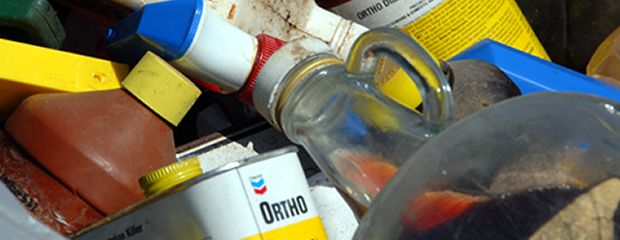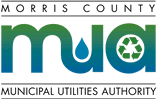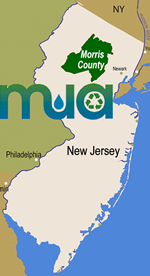Transfer Station Info (Tip Fee $113.00/ton)
- Mt. Olive Mon-Fri 7:30am-3pm; Sat 7:30am-11am
- Parsippany Mon-Fri 7am-3pm; Sat 7:30am-11am
- No Rental Trucks
- Payment by Account, Check, Credit Card. No Cash

Morris County
Municipal Utilties Authority
Join
3/6/26, 11AM MCMUA Bid Opening #2026-SW01 - 3 SELF CONTAINED COMPACTING UNITS
Join via Webex
or use the call in number: 408-418-9388 with Access code: 2348 996 4225.
Click to go to Notice/Bids Page

F.A.Q. Pesticides
The MCMUA operates one of NJ's most comprehensive household hazardous waste (HHW) programs. This F.A.Q. page and information on hazardous materials is intended as a guide about HHW materials as well as the MCMUA's HHW program. This information is a general guide and does not constitute official rule, regulation or law.
Hazardous Waste Materials
- Adhesives
- Aerosols
- Antifreeze
- Appliances (CFCs)
- Art & Crafts
- Asbestos
- Batteries (Auto & Boat)
- Batteries, Household (dry cell)
- Cell Phones
- Compressed Gas Cylinders
- Driveway Sealer
- Electronics
- Fire Extinguishers
- Fluorescents
- Gasoline
- Medical Waste
- Kerosene
- Mercury
- Motor Oil & Filters
- Muriatic Acid (HCl)
- Paints & Stains
- Pesticides
- Photo Chemicals
- Pool Chemicals
- Propane
- Rock Salt
- Smoke Detectors
- Solvents
- Wood with Lead Paint
Hazards
- Pesticides and herbicides are designed to be toxic to pests and can harm birds, fish, pets and humans if misused.
-
If lawn chemicals, pesticides or herbicides are used in larger doses than recommended on the label, runoff can have an adverse effect on drinking water supplies and the environment.
Handling
- Avoid buying more product than you need, as it is likely to become waste at a later date.
- Store pesticides in original containers that are closed and labeled, in a secure area out of reach of children and pets. Avoid storing pesticides in damp areas where containers may become moist or rusty. Pesticides should NOT be stored near food.
- Follow label instructions strictly about where and how much to apply.
- Do NOT put pesticides in the trash or down the drain.
- Use rubber gloves when handling pesticides and use an appropriate cartridge mask if using products extensively.
- Do NOT use or give away banned pesticides or pesticides that are no longer registered for use. EPA maintains a list of over 50 banned pesticides Click here for the list. To find out whether a product is no longer registered for use in New Jersey, contact the NJDEP.
- For questions on specific pesticides and environmentally friendly products and procedures, such as Integrated Pest Management, call the New Jersey Pesticide Bureau at 609-530-4070.
-
For more information on identifying pesticides, their health hazards, and use and Management guidelines, call the National Pesticide Telecommunication Network at (800) 858-7378.
Management Options
-
Banned or Unregistered Pesticides:
- If the pesticide is banned or no longer registered for use, save in original container for the next household hazardous waste collection day.
-
Registered Pesticides:
- If the product is still registered for use, use up according to directions on the label or donate it to a friend or neighbor who can use it.
- If you no longer have a use for the product and are not able to give it away, save it for a HHW collection day or take to a commercial hazardous waste facility.
-
Empty Containers:
- Do NOT recycle or reuse pesticide containers.
- Empty containers should be triple rinsed and then disposed of in the trash. Take the following steps to triple rinse a container:
- Fill the empty pesticide container with cold water and use the rinse water as if it were full-strength product, in accordance with the label instructions.
- Repeat this procedure two more times.
- Do NOT pour rinse water down the drain.
- Once the container is empty and triple rinsed, it should be wrapped in newspaper and disposed of in the trash.
- Do NOT triple rinse containers for banned or unregistered pesticides. Save these for the next household hazardous waste collection day.

